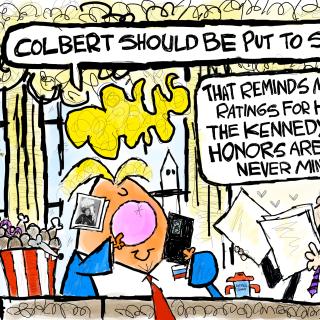Many journalists probably got into the field for the same reason I did: because they were inspired by Washington Post reporters Bob Woodward and Carl Bernstein and their courageous work to unravel the Nixon era’s Watergate scandal.
A 1976 film based on their efforts, All the President’s Men, was likely the strongest recruiting tool the journalistic profession ever had.
In contrast, Kill the Messenger may be journalism’s weakest recruiter. It may even persuade some would-be reporters to forge a new career path.
True, the film shows journalism at its best in the form of Gary Webb (Jeremy Renner), a reporter who fights to reveal an alleged connection between the CIA and inner-city drug sales. But it also shows modern journalism at its worst in the form of major media outlets (including The Washington Post) that seem more eager to leap to the CIA’s defense than they are to give Webb’s findings a fair hearing.
Directed by Michael Cuesta and based on two books written (respectively) by and about real-life reporter Webb, Kill the Messenger is a startling expose of a little-known chapter in the 1980s Iran-Contra scandal.
It quickly came out that elements of the Reagan administration were secretly selling arms to Iran to help fund the Contras, a rebel force seeking to overthrow Nicaragua’s left-wing government. But it wasn’t until the following decade that Webb received evidence the CIA had been facilitating sales of crack cocaine to raise money for the same purpose.
The twisted path that leads Webb, a reporter for the San Diego Mercury News, to the story is the most absorbing part of Cuesta’s film. Tipped off by a flirtatious woman with her own agenda, Webb is soon following the leads to a Nicaraguan prison and a makeshift airfield once used by drug smugglers.
Ignoring warnings that he’s wading into dangerous waters, Webb and his paper publish the shocking story. And that’s when the real trouble begins.
At first hailed as a hero and nominated for an award by his local branch of the Society of Professional Journalists, Webb soon finds himself under attack. In effect, he becomes the story as news accounts question his facts and motives.
When someone dredges up a past affair, it appears that not even his character will be off-limits. The resulting turmoil ultimately puts a strain on Webb’s relationships with his editor (Mary Elizabeth Winstead), his wife (Rosemarie DeWitt) and his family.
It’s a troubling story that, sadly, is not told as well as it could have been. Despite an impassioned performance by Renner, the bulk of the film never regains the power of the first half-hour. Peter Landesman’s disjointed script is part of the problem.
There’s also a feeling that we’ve been victimized by a bait-and-switch scheme: Cuesta and Landesman prime us for a political thriller, only to give us a tale of personal tragedy. But reality is the culprit here, since they’re only depicting what actually happened.
Does journalism deserve the black eye it receives from Kill the Messenger? No doubt. Some say Webb was not as careful a reporter as he should have been, but the general consensus is that he was a lot closer to the truth than his critics.
As a final indictment of the press, the film’s postscript charges that the CIA-crack connection, with its devastating impact on inner-city neighborhoods, was largely ignored because the media were then obsessed by the Clinton-Lewinsky affair. Talk about your misplaced priorities.
Rating: 3 stars (out of 5)
Kill the Messenger, rated R, opens Friday (Oct. 10) at the Gateway Film Center and AMC Lennox Town Center 24 theaters in Columbus.
Editors Note: The Free Press has run a number of stories on the work of Gary Webb, including one by the late great Alexander Cockburn, which can be read here.



